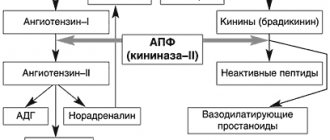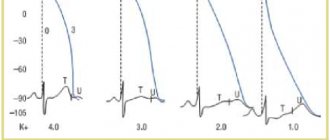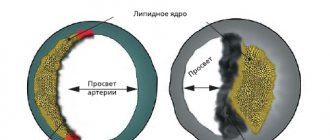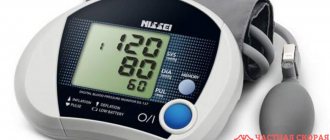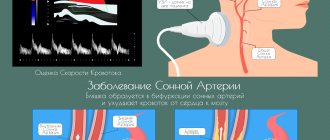Antihypertensives (from other gr. hypo decrease and lat. tensio tension, pressure) are medications that lower blood pressure and are used primarily for the treatment of hypertension. Therefore, they are also called antihypertensive drugs.
Arterial hypertension is distinguished as primary (hypertension or essential hypertension) and secondary (symptomatic).
The causes of hypertension are not completely known. An important role in the development of the disease is played by prolonged psycho-emotional stress, chronic stress, age-related decrease in vascular elasticity, excessive consumption of table salt and a sedentary lifestyle.
Secondary (symptomatic) arterial hypertension occurs due to an adrenal tumor. The tumor secretes large amounts of adrenaline, which is released into the blood, causing an increase in blood pressure. Also, symptomatic arterial hypertension can occur with kidney disease. In such cases we talk about renoprival hypertension. Secondary hypertension can be a symptom of other diseases.
The most popular drugs for high blood pressure
April 5, 2021
16403
4.9
6
Content
- Captopril
- Amlodipine
- Losartan
- Prestarium
- Veroshpiron
- Concor
- Enalapril
Blood pressure can tell a lot about the state of the cardiovascular system, the functioning of the endocrine organs, the hematopoietic system and the nervous system. There is simply no universal remedy for blood pressure, because blood pressure can be constantly high, or it can rise sporadically. High blood pressure can be an independent pathology, or it can be one of the symptoms among a whole list of problems.
Therefore, you cannot just come to the pharmacy and ask for “something for blood pressure” - such drugs are prescribed exclusively by a doctor, knowing the full picture of the disease.
Classification of antihypertensive drugs
Blood pressure is maintained by several physiological mechanisms: peripheral vascular resistance, heart rate and circulating blood volume. Antihypertensives usually affect one or more mechanisms of blood pressure maintenance.
Drugs that reduce the activity of the sympathetic nervous system
- Central type of action (clonidine, methyldopa, guanfacine, moxonidine)
- Beta-blockers (metoprolol, nebivolol, bisoprolol, atenolol, betaxolol, talinolol, carvedilol)
- Alpha blockers (prazosin, doxazazin, terazosin)
- Gagnlioblockers (hexamethonium benzosulfonate, azamethonium bromide, etc.)
Peripheral vasodilators (peripheral vasodilators)
- Angiotensin-converting enzyme inhibitors (enalapril, lisinopril, ramipril, captopril, perindopril, moexipril, spirapril)
- Angiotensin II receptor antagonists (valsartan, irbesartan, losartan, telmisartan, eprosartan)
- Calcium ion antagonists (nifedipine, amlodipine, lacidipine, isradipine, verapamil, diltiazem)
- Antispasmodics of myotropic type of action (papverine, bendazole)
Agents affecting water and electrolyte balance
- Diuretics (hydrochlorothiazide, indapamide, torsemide, chlorthalidone, spironolactone)
In addition to the drugs listed in the classification, blood pressure can be lowered by drugs that reduce psycho-emotional stress. For example, sedatives or tranquilizers.
Captopril
This is one of the best drugs when you need to quickly lower your blood pressure. "Captopril" is not prescribed for use on an ongoing basis or in a course. This drug is often prescribed if a person has heart problems. Captopril has different dosages, but the most popular is 25 mg. For optimal results, take one tablet and place the second one under the tongue.
Captopril
OZON, Russia
Arterial hypertension (including renovascular), chronic heart failure (as part of combination therapy), left ventricular dysfunction after myocardial infarction in patients in a clinically stable condition.
Diabetic nephropathy in type 1 diabetes mellitus (with albuminuria more than 30 mg/day). from 8
5.0 1 review
810
- Like
- Write a review
Features of the treatment of hypertension
Therapy for hypertension is not carried out periodically, but with the constant use of an antihypertensive drug.
It is an extremely dangerous misconception to use the drug only “when there is pressure.” If hypertension is diagnosed, there is a tendency for a persistent increase in systolic pressure above 140 mm. rt. Art., an antihypertensive drug is taken daily, preferably at the same time, under constant monitoring of blood pressure, for life.
Amlodipine
This long-acting blood pressure medication is available by prescription and is very popular. Amlodipine helps cells become saturated with oxygen, therefore preventing heart attacks. The medicine is also prescribed for angina pectoris.
Amlodipine
OZON, Russia
Arterial hypertension (monotherapy or in combination with other antihypertensive drugs).
Angina pectoris, vasospastic angina (Prinzmetal angina) from 16
826
- Like
- Write a review
Read also: Top 10 best blood thinners Blood thinners
When can you not do without a doctor?
In the treatment of arterial hypertension, other drugs are traditionally used, which, in general, do not have pronounced features inherent in any specific group of antihypertensives. For example, the same dibazole or, say, magnesium sulfate (magnesia), which is successfully used by emergency doctors to relieve a hypertensive crisis.
Magnesium sulfate injected into a vein has an antispasmodic, sedative, anticonvulsant and slightly hypnotic effect. A very good drug, however, it is not easy to administer: it must be done very slowly, so the work lasts for about 10 minutes (the patient becomes unbearably hot - the doctor stops and waits).
For the treatment of hypertension, in particular, in severe hypertensive crises, pentamine-N (an anticholinergic blocker of the sympathetic and parasympathetic ganglia, which reduces the tone of arterial and venous vessels), benzohexonium, similar to pentamine, arfonad (ganglioblocker), and aminazine (phenothiazine derivatives) are sometimes prescribed. These drugs are intended for emergency care or intensive care, and therefore can only be used by a doctor who is well aware of their characteristics!
Losartan
This drug can be taken as a course or once for emergency blood pressure reduction. "Losartan" acts instantly, without having a negative effect on the cardiovascular system. A maximum of an hour after administration, the blood pressure returns to normal. The drug is also prescribed if a person suffers from heart failure.
Losartan
JSC VERTEX, Russia
Arterial hypertension.
Reducing the risk of associated cardiovascular morbidity and mortality in patients with arterial hypertension and left ventricular hypertrophy, manifested by a combined reduction in the incidence of cardiovascular mortality, stroke and myocardial infarction. Protection of the kidneys in patients with type 2 diabetes mellitus with proteinuria - slowing the progression of renal failure, manifested by a decrease in the incidence of hypercreatininemia, the incidence of end-stage renal failure requiring hemodialysis or kidney transplantation, mortality rates, as well as a decrease in proteinuria. Chronic heart failure (as part of combination therapy, with intolerance or ineffectiveness of therapy with ACE inhibitors). from 30
1200
- Like
- Write a review
Side effects of blood pressure pills
Any medicinal substance, no matter how high-quality and expensive it is, can lead to side effects. Some unwanted effects, such as various allergies, cannot be prevented.
Children, the elderly, pregnant women, and patients with liver and kidney damage are at risk for developing side effects.
Side effects from different groups of drugs:
- Diuretics - dehydration, water-electrolyte imbalance, decreased blood pressure, arrhythmias, photosensitivity, allergies.
- Beta adenoblockers - bradycardia, vertigo, migraines, increased circulatory failure, decreased blood pressure, nausea, bronchospasm, heart block, sleep disorders, depression.
- Calcium antagonists - bradycardia, AV block, decreased blood pressure, angina pectoris, dizziness, hot flashes, tinnitus, runny nose, abdominal pain, nausea, edema, constipation.
- ACE inhibitor - dizziness, hypotension, weakness, tachycardia, dry cough, shortness of breath, nausea, diarrhea, abdominal pain, rashes, angioedema, itching, asthenia, blurred vision, electrolyte imbalance, loss of appetite.
Prestarium
The advantage of this blood pressure drug is that it not only helps reduce blood pressure, but also treats hypertension, even complex forms. Prestarium is prescribed if there is a risk of heart attack; patients who have problems with cerebral circulation can take it. But the problem is that Prestarium tablets are not available in all pharmacies and they are not cheap. But there are analogues of this medicine that a doctor can select.
Prestarium
SERVIER (Servier), France
A drug used for arterial hypertension and heart failure.
Also for such indications as: Prevention of recurrent stroke in patients with cerebrovascular diseases. Prevention of cardiovascular complications in patients with documented stable coronary heart disease. from 193
1046
- Like
- Write a review
Ways to lower blood pressure permanently
In the initial stages of hypertension, the first step is to prescribe therapy with non-drug methods associated with changing the patient’s lifestyle:
- To give up smoking. Tobacco smoking is recognized as one of the main risk factors for the development of arterial hypertension. One cigarette smoked leads to a sharp increase in blood pressure and increased heart rate.
- Normalization of body weight. Numerous studies have proven that losing weight in overweight or obese patients leads to stabilization of blood pressure.
- Increasing physical activity. Regular dynamic physical exercises in the air for 50-40 minutes at least 4 times a week are recommended.
- Reducing salt intake to 5 g/day.
- Limit alcohol consumption.
- Compliance with the work and rest regime.
- Balanced diet. Increasing the proportion of plant foods and low-fat dairy products in the diet.
While blood pressure is slightly elevated, following the principles of a healthy lifestyle can stabilize blood pressure at a normal level with minimal drug support or even without drugs at all.
As the disease progresses, hypertension is treated using medications from various pharmacological groups to achieve a reduction in blood pressure to normal levels.
First aid at home for symptoms of high blood pressure:
- It is necessary to reassure the patient and create conditions for physical and emotional peace.
- Provide a flow of fresh air into the room.
- Breathing exercises help to quickly reduce pressure: take a deep breath, hold your breath for 10 seconds, exhale noisily through your mouth, then take short breaths in and out through your mouth for 2 minutes.
- Give the patient Corvalol to drink: dissolve 30 drops in 100 ml of water.
If attacks recur repeatedly, you should consult a doctor to find out the cause of the increase in pressure.
Veroshpiron
This medicine helps the body remove excess fluid, eliminating swelling. Potassium in Veroshpiron improves the functioning of the heart and blood vessels, and many patients note that the drug relieves seizures.
Veroshpiron
Gedeon Richter, Hungary
The drug Veroshpiron is a potassium-sparing diuretic.
from 64
989
- Like
- Write a review
Read also How to treat migraine: the best drugs Top 5 best drugs against migraine
Concor
The active ingredients of these blood pressure pills reduce the amount of adrenaline in the blood, which has a good effect on the functioning of the heart. Concor reduces heart rate and is suitable for those who have had a heart attack. But Concor is not suitable for older people and those with severe hypertension.
Concor
Merkle GmbH, Germany
- arterial hypertension;
— IHD: stable angina; - chronic heart failure. from 123
5.0 1 review
1390
- Like
- Write a review

